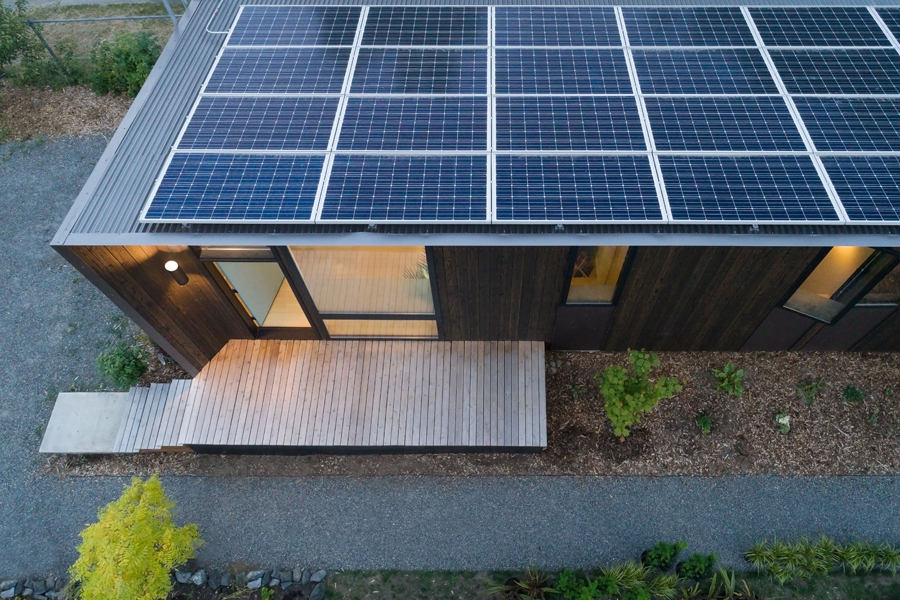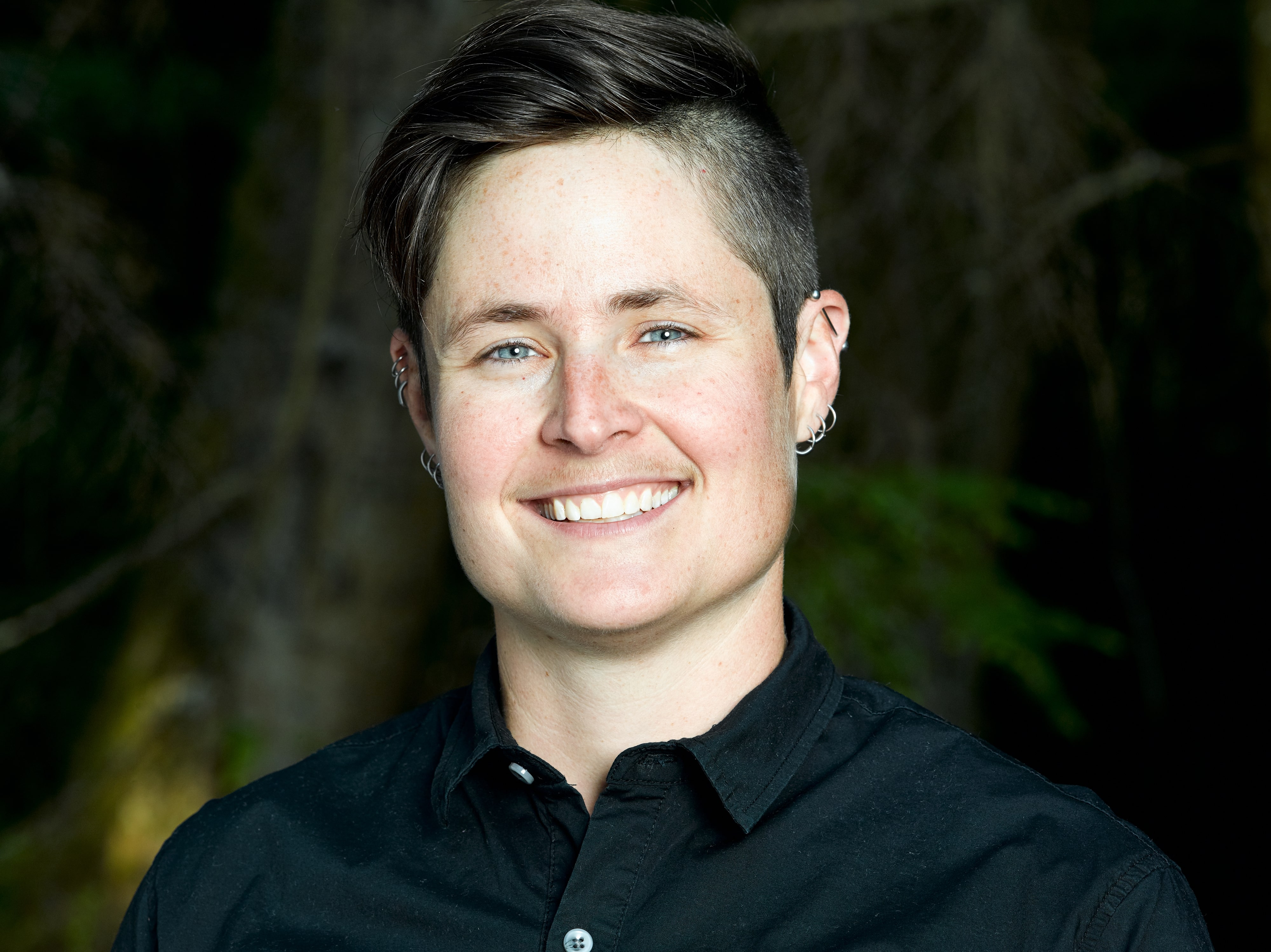With a background in sustainability and a belief in affordability, entrepreneur Bec Chapin sees the housing industry with a different lens than many other builders.
To Chapin, the central challenge for builders is not the shortage of land, but labor. “We need so much more housing than we have labor to build,” says Chapin, who hopes to address that problem with Node, a Seattle-based housing startup focused on creating affordable, sustainable buildings.
Chapin is one of the women UTOPIA is highlighting this year in our special report on women in construction, which also features a public homebuilder executive, an engineer at a building products manufacturer, and a small private homebuilder.
Launching a startup is not for the weak; Chapin’s days as CEO are long ones. They typically start with a standup meeting with ther team at their 10,000-square-foot R&D shop, where the company will soon be launching their own manufacturing operations. After the standup meeting, the team takes over prototyping, and Chapin concentrates on raising money and developing partnerships. They frequently meet with investors, venture capitalists, and other potential partners to support the young startup, reviewing specific prototypes as needed.
RELATED: Nicole Tysvaer Discovers New Career as Entrepreneur
“I love building something new. Startups are fast-paced, there’s always too much to do, and we bounce back and forth from working on the business, fundraising, building, and prototyping,” Chapin says. “ It's always moving.”
Career Experience in Prefab and Green Infill Housing
Chapin got involved in sustainably-oriented housing early, joining modern prefab builder Method Homes. “I just got to see the potential of prefab,” says Chapin, who wanted to find a way to bring more green, sustainable housing to more people.
The future Seattle-based innovator took those ideas to business school, earning an MBA in sustainability from Presidio Graduate School in Washington State. After that, Chapin went to work at Green Canopy, a green infill builder in Seattle and Portland, Ore. “I was vice president of construction operations over there and got the chance to put a bunch of systems into place,” Chapin says. “I led a reorganization that allowed us to build the same number of houses on time and on budget—and I basically worked myself out of a job.”
Chapin took that moment to consider next steps. “I took a deep breath and thought, ‘What’s next?’”
The answer turned out to be Node.

Seeking to Build Sustainable Homes in New Way
Thanks to an introduction via Green Canopy’s leadership, Chapin met with Don Bunnell, an angel investor in Seattle who came to sustainable housing after a career in the energy industry. Once the two talked, Chapin decided to join Node as a co-founder.
“Don and I really connected over our strongly held belief which is that practically all the technology to build carbon-negative homes exists today,” recalls Chapin. Why isn’t it happening? It’s still just too expensive for many builders—and home buyers. But Chapin doesn’t believe it needs to be that way. “The way to get sustainable homes to be prolific is to make sustainability cheaper—or at least the same price as regular building,” they say.
RELATED: Kimberly Llewellyn Pushes for Higher Energy Performance
But solving that equation can be challenging. Modular homes can be “super sustainable,” with a carbon footprint that’s a fraction of a traditional home, Chapin says. “But it doesn’t scale. People ask why we haven’t seen modular take off. Well, it’s because you spend all the money you save in the factory on the crane, the truck, and the labor onsite. With the labor market what it is, the only way to bend cost curves in housing is to drastically change how houses are built. And the answer is not consolidating labor in a factory and then using an expensive crane and an expensive truck to get [the house] on site to hire all the same labor again.”
With that in mind, Chapin and colleagues at Node took a different approach. “We have been creating a kit that has a house assembly kit with a very simplified installation,” Chapin explains. “This allows us to maximize generalist labor and get houses built faster.”
The company, which currently has a strategic developer and builder partner in the Pacific Northwest, has the capability of offering everything from a small accessory dwelling unit to townhomes and small apartment buildings. “It’s a big range, but this is the range where construction efficiency hasn’t really taken off,” Chapin points out. “We are looking at this area of the market where small operators could use a lot of help operating more efficiently and building more houses.”
For now, though, it’s a small operation. “We’ve built just a handful of [Node buildings],” Chapin says. “We’ve been really focused on getting the tech built in the shop.”
That research and development matters, because the goal is to develop a product line and processes that can scale up to meet the need for housing that Chapin sees in the Pacific Northwest and elsewhere.
Challenges for Women in Construction
That commitment to that work has been an essential motivator for Chapin, who must navigate both the startup world and the construction industry. “I think most biases are unconscious, but they are solidly there, and they’re not subtle,” Chapin says of how people sometimes react to women in construction. “It’s better once they get to know you.”
But as the technical founder of Node, Chapin stands out both as a woman in construction and a woman in the startup world. It can be an uncomfortable place to be. At meetings, Chapin often has been one of only a few women--or the only woman--in the room. On job sites, visitors have gone up to the nearest man to ask who’s in charge, even as Chapin stood right there. Chapin has seen subs and others ignore women site superintendents. “It’s hard at times. In the startup world, most investor money is not going to women, and you don’t even see many women in technical jobs or construction startups,” says Chapin, who has seen the surprise on people’s faces when they discover that they, not the male co-founder, is the technical expert at the meeting. “The overt reactions are almost easier to manage, because you can have a friendly but firm conversation with them, and people are caught off-guard and say, ‘Oh, I’m so sorry.’”
RELATED: Women in Construction: Hiding in Plain Sight
The experience has pushed Chapin to make Node an inclusive company that welcomes women, minorities, and people with nontraditional backgrounds. “We are constantly focused on making our company reflect the demographics of our society. That means intentionally interviewing and hiring, because we know that diverse perspectives create better products and results--and not everyone got here on the same path.,” Chapin says. “I am always thinking, ‘How can I lift more people up so they don’t have to go through what I went through? How can we change the world?”
RELATED: Ricarda Dietsch Leaves East Germany and Discovers American Dream






